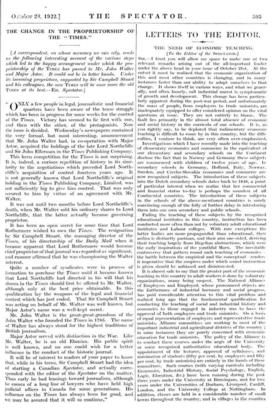THE CHANGE IN THE PROPRIETORSHIP OF THE TIMES."
[A correspondent, on whose accuracy we can rely, sends us the following interesting account of the various steps which led to the happy arrangement under which the pro- prietorship of the TIMES has passed to Mr. John Walter and Major Astor. It could not be in better hands. Under its incoming proprietors, supported by Sir Campbell Stuart and his colleagUes, the new TIMES will be once more the old TIMES at its best. —ED. Spectator.] " ONLY a few people in legal, journalistic and financial quarters have been aware of the tense struggle which has been in progress for some weeks for the control of the Times. Victory has seemed to lie first with one, and then with the other, of the protagonists. Now the issue is decided. Wednesday's newspapers contained the very formal, but most interesting, announcement that Mr. John Walter had, in co-operation with Major Astor, acquired the holdings of the late Lord Northcliffe and Sir John Ellerman in the Times Publishing Company.
This keen competition for the Times is not surprising. It.is, indeed, a curious repetition of history in its simi- larity to the negotiations which preceded Lord North- cliffe's acquisition of control fourteen years ago. It is not generally known that Lord Northcliffe's original holding in the Times Publishing Company, Limited, was not sufficiently big to give him control. That was only secured to him by virtue of an agreement with Mr. Walter.
It was not until two months before Lord Northcliffe's death, when Mr. Walter sold his ordinary shares to Lord Northcliffe, that the latter actually became governing proprietor.
It has been an open secret for some time that Lord Rothermere wished to own the Times. The resignation by Sir Campbell Stuart, the managing director of the Times, of his directorship of the Daily Mail when it became apparent that Lord Rothermere would become chief proprietor of that journal was regarded as significant, and rumour affirmed that he was championing the Walter interest.
Quite a number of syndicates were in process of formation to purchase the Times until it became known that Lord Northcliffe had directed in his will that his shares in the Times should first be offered to Mr. Walter, although only at the best price obtainable. In this qualification lay the weapons of the legal and financial contest which has just ended. That Sir Campbell Stuart was acting on behalf of Mr. 'Walter was well known, but Major Astor's name was a well-kept secret.
Mr. John Walter is the great-great-grandson of the John Walter who founded the Times in 1785. The name of Walter has always stood for the highest traditions of British journalism.
Major Astor served with distinction in the War. Like Mr. Walter, he is an old Etonian. His public spirit is well known, and no one could wish for a better influence in the conduct of the historic journal.
It will be of interest to readers of your paper to know that, while in his teens, Sir Campbell Stuart had the idea of starting a Canadian Spectator, and actually corre- sponded with the editor of the Spectator on the matter. Thus, early he had leanings toward journalism, although he comes of a long line of lawyers who have held high judicial offices in Canada for some generations. His influence on the Times has always been for good, and we may be assured that it will so continues"










































 Previous page
Previous page